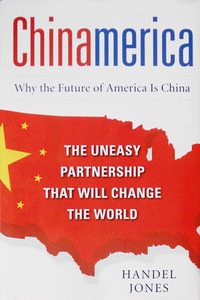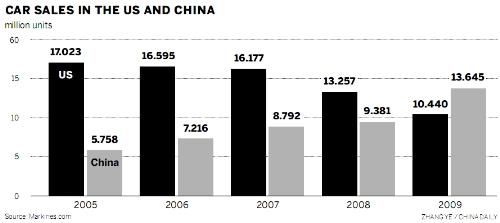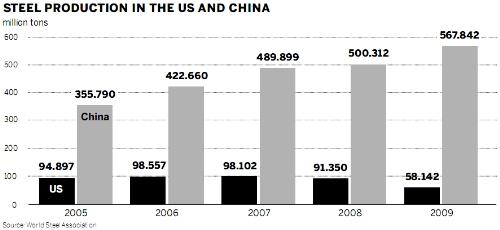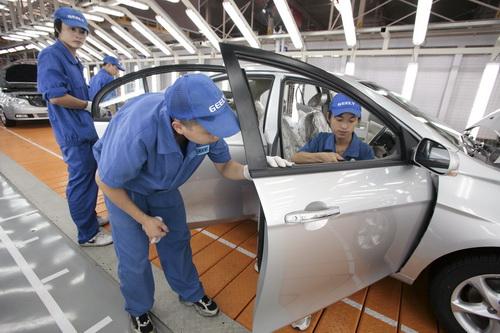Jones: China and US should cooperate, share global wealth
Video: Exclusive interview with Handel Jones
SHANGHAI - Handel Jones has a bird's eye view of the huge and sprawling metropolis of Shanghai on both sides of the Huangpu River from his hotel room in downtown Shanghai.


As an American, however, Jones is also worried. In contrast to China's growth, Jones says his own country is in "serious trouble".
"We are clearly not ready to take the hard actions required to reverse the downward spiral," he writes in his new book, Chinamerica: The Uneasy Partnership that Will Change the World.
The book, with a map of the US swathed in a Chinese five-star red flag on the cover, was published by McGraw Hill in July. In the book, Jones relates his worries and concerns about the future of the US while trying to understand "why the future of America is China"."The cover is very shocking," Jones said in an exclusive interview with China Daily.
But "I want to give the United States a wake-up call", he said.
The book tells both the US and China stories. Jones traces the rise and fall of industries in the US, which he labels as a "weakening giant". Filling his narratives with charts, he also analyzes why the US automobile and steel industries have declined and what potential risks the American computer industry faces despite its successes to date, as represented by Steve Jobs' Apple Inc.
"Look at the (US) automobile industry, it is disastrous," he said.
"The steel industry in the US used to be strong but it is now very weak. Electronics is still very strong, but the problem is that the manufacturing is in China. So even though you buy electronic products in the US, you are still buying imports."
In the book, Jones gives an almost equal amount of space to the rapid industrialization of China, which he terms "the growing giant".
He interweaves the growth of each industrial and economic sector from textiles, machinery, automobiles, electronics, raw materials, infrastructure and transportation with his explanation of Chinese culture, government policies and economic philosophies.
There are things in China that Jones does not approve of. For instance, he believes that people are being used as an asset in China and a lot of decisions are made from the top down."What I keep seeing in China is the duality in terms of concepts. You revere nature, basically from some of the Confucian philosophies, and then you can have this incredible pollution," he said.
In the book, he also points out that China may falter and its global competitiveness may decline if "the system becomes bureaucratic, or if government officials and their families selfishly try to enrich themselves rather than create wealth for the good of society".
 However, so far "we think the government policies are very supportive of industries in China, whereas government policies in the US are very negative towards industries", he said.
However, so far "we think the government policies are very supportive of industries in China, whereas government policies in the US are very negative towards industries", he said.It took the West some 200 years to go through the phases of economic growth, he said, but "everything here is compressed" into 20 to 50 years.
"We are working with some of those companies here on new forms of energy. The next generation could be nuclear, some wind, some solar," he said, avoiding the specific names of Chinese companies because they are his clients.
In the West, many treat a rising China as a threat. But Jones said he hopes his book will help more people in the US realize that China and the US, rather than being antagonistic, can cooperate and share global wealth.
"The US cannot go back to making factories to produce millions of phones. That expertise is gone," he said.
But the US has great potential to develop the medical and pharmaceutical industries as well as medical electronic industry, as these are "very software centric", as well as areas like clean energy.
"The US can spend a hundred billion dollars developing very advanced fighter aircraft, strategically it is important," he said.
But "if you spend a significant amount of money developing a car, an automobile that could do 100 miles to a gallon, that could produce a lot of wealth".
Above all, the US must delve into "really leadership technologies" and cooperate "with China in terms of the mass market of today's product. So the US would have some kind of advanced products, with the understanding that China would import those products," he said. "So we would have balance of trade."
"So I think 90 percent of the action needs to be taken by the US, not China, because the US has to get its own house in order first," he said.
But there is still the need to understand an emerging China, Jones said, even though the process can be long and difficult.
The Oriental TV and Jinmao towers that he can see glistening in the distance from his hotel window do not say much about China, its people and its environment.
"My philosophy is, from the hotel room, you see a facade. You have to be in the street, among the people, to start feeling the environment. What is important about a country is what is inside its people."
For Jones, the journey to "get inside the people in China" is like visiting the Forbidden City. "You go through one gate, you think you are inside, but you are not. You walk through another gate, you think you are inside, but you are not. You walk through another.
"And it takes many, many gates before you get inside China," he said, adding that by going through these many gates, he has learned of the different cultures in coastal areas and the interior, between the north and the south, and between cities and rural areas.


Workers perform a quality check on the assembly line of the Geely Automotive Holdings Ltd factory in Ningbo, Zhejiang province. Handel Jones book interweaves the growth of industries including automobiles with explanations of Chinese culture, government policies and economic philosophies. [Photo/Bloomberg]
"Smart American people now spend a lot of time here trying to understand what long-term benefits are (in China)."
However, he said a political agenda often prevents some Americans from trying to understand China.
Take the currency valuation as an example. "Basically the revaluation of the renminbi is a major part of the political agenda," he said. "It forces US problems on China."
He said an appreciation of the renminbi would not have much effect on the US economy. China may buy more corn or a few more aircraft from Boeing, but "that doesn't change things very much at all", he said.
"It is false analysis by the US where they are blaming US problems on China as opposed to addressing the problems from the US side."
Jones said he became interested in China in 1983, when he gave a lecture of the future of electronics industry to a Chinese delegation headed by Jiang Zemin as then Minister of the Electronics Industry.
During lunch, Jiang "was telling me about China, some of his goals for China, and I was fascinated", he recalled.
In his effort to mingle and understand the Chinese, Jones said he sometimes gets upset and angry.
"I get cheated and feel very stupid sometimes," he said, recalling a bargain he struck with a saleslady for two pairs of rings. He ended up paying 80 yuan ($11.80) for the little items that were worth 10 yuan ($1.5) at most. But he is undaunted.
Instead, he began to study the ancient Chinese 36 strategies, a crystallization of ancient Chinese wisdom in warfare.
In fact, he has almost finished his next book, interpreting Chinese strategies for personal life and business, applying the examples of the Boeing 747, Apple and the Toyota Prius, as well as in forging people-to-people relationships, he said.
Meanwhile, he has also finished planning his third book, What Does China Think? What Does China Do in the Future.
"China invented gunpowder and the printing press," he said. "A lot of these inventions were not well utilized in terms of global position. So is China today different? Or will China become introverted and protective of everything?
"We think today's China is different. We think China really understands what it takes to be a global power. So we are trying to figure out what China will be like in 10 years," he said.
A bright future notwithstanding, China faces a lot of challenges, Jones said.
Management in China is relatively weak, he said. There is a lack of training in strategic business planning and marketing, because "the experts are not here to provide the training".
"There are very few Chinese companies today that are very successful in the global market. Huawei is an exception; ZTE is becoming an exception; Haier is starting to become an exception," he said. "But in general, they don't have the ability yet to compete in the global market."
Moreover, China has to tackle such problems as pollution, the income divide and developmental differences between coastal cities and the interior and different mindsets held by the old and the young.
"So the government has a very challenging (job) in managing growth, the growth of the middle class, industries, not over-consuming, and allowing people's minds to become more global," he said.





